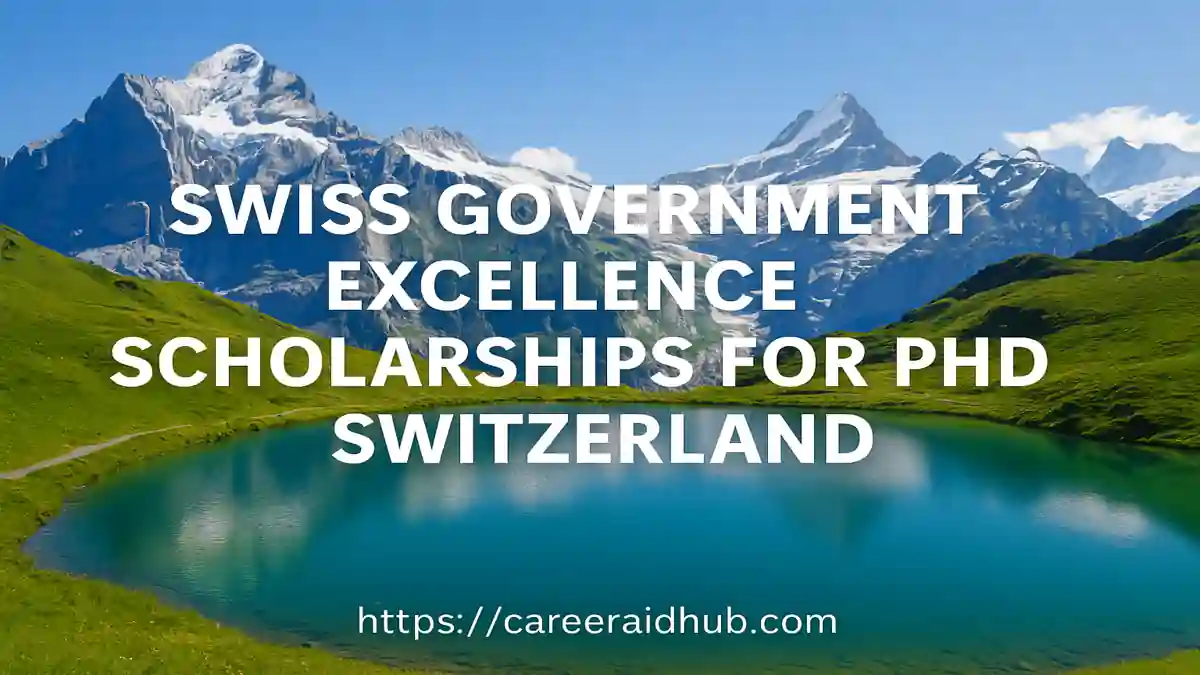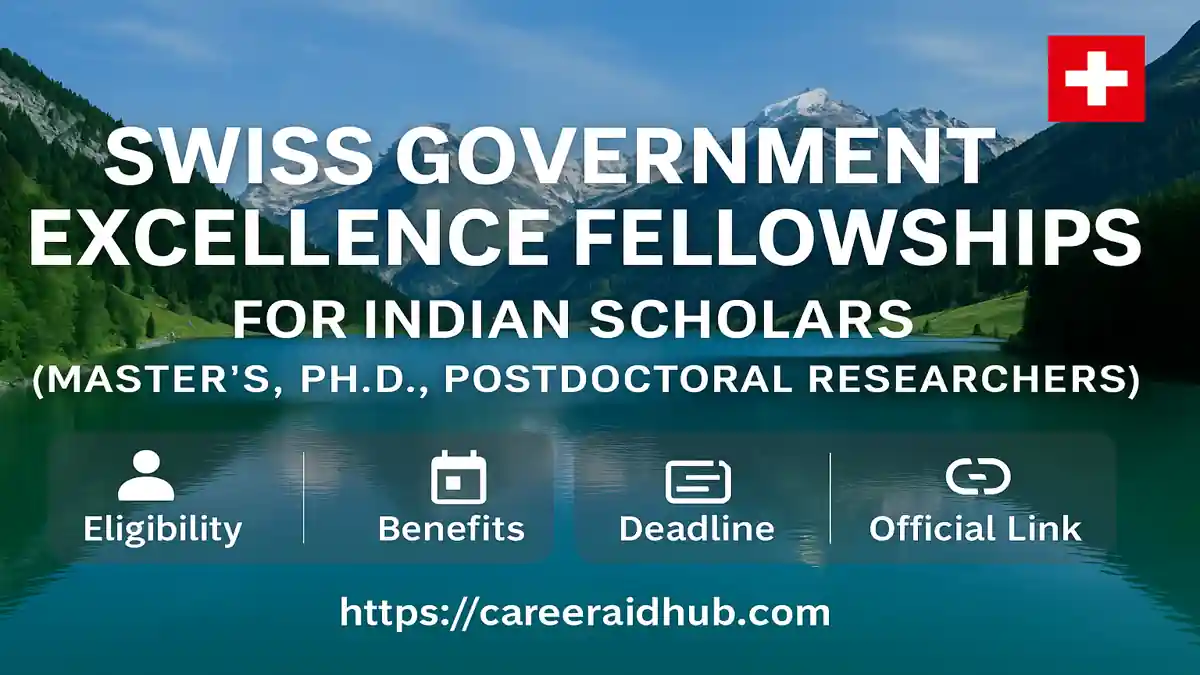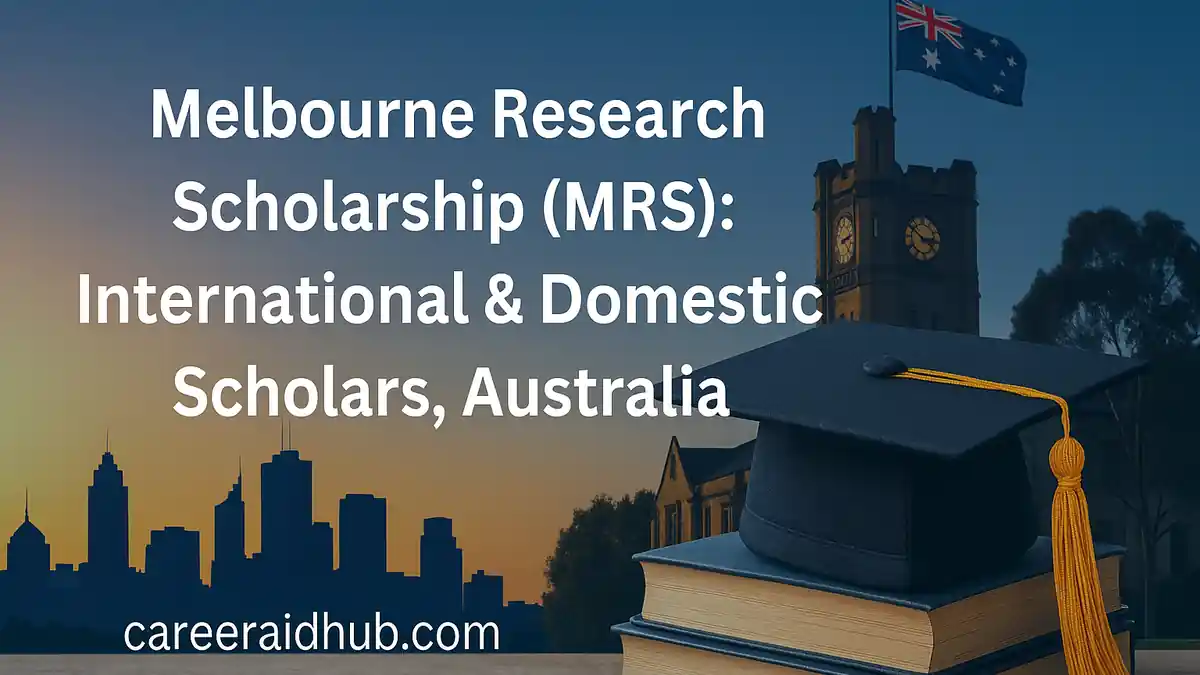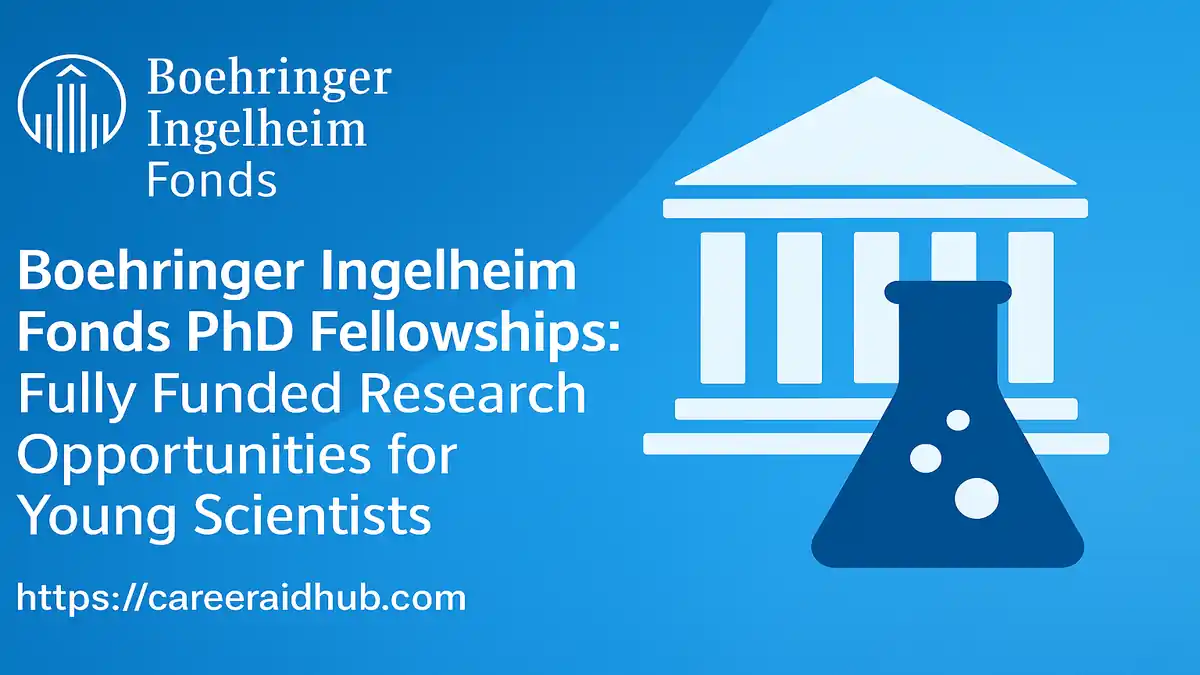Swiss Government Excellence Scholarships for PhD: A Complete Guide
Switzerland stands as a global leader in higher education, research innovation, and cross-border scientific collaboration. To strengthen academic and cultural ties with the world, the Swiss Confederation offers the Swiss Government Excellence Scholarships to foreign researchers and students. Among these, the PhD scholarships are highly prestigious and serve as a bridge for outstanding scholars to undertake doctoral research in Switzerland’s renowned institutions.
The program is administered by the Federal Commission for Scholarships for Foreign Students (FCS), which carefully selects candidates based on academic excellence, research quality, and host institution support. For ambitious PhD aspirants, this scholarship is not just financial aid—it is an entry into Switzerland’s globally respected research ecosystem.
The Swiss Government Excellence Scholarships for PhD empower talented international researchers to pursue doctoral training at leading Swiss universities. With financial support, research freedom, and global collaborations, this program opens doors to academic excellence while strengthening international scientific partnerships. A true gateway to one of Europe’s most innovative ecosystems.
What Is the Swiss Government Excellence Scholarship for PhD?
The scholarship supports international students who wish to complete their full doctoral studies at a recognized Swiss university,
Unlike subject-specific fellowships, this program is open to all disciplines. Whether in natural sciences, humanities, engineering, social sciences, or creative fields, applicants with a compelling research proposal and institutional support can apply. This flexibility makes it one of the most inclusive and competitive global PhD funding opportunities.
Eligibility Criteria for PhD Applicants
To ensure fairness and maintain excellence, strict eligibility conditions apply:
Educational Qualification: A Master’s degree (or equivalent) that qualifies for doctoral studies in the applicant’s home country.
Host University Acceptance: Proof of acceptance from a Swiss professor who agrees to supervise the doctoral project.
Academic Timeline: Applicants should typically have obtained their Master’s degree within the last few years.
Language Requirements: While English is widely accepted for research, certain universities or projects may require proficiency in German, French, or Italian.
Nationality: Scholarships are available only to foreign students. Swiss citizens and permanent residents are not eligible.
Applicants should confirm country-specific requirements through the Swiss Embassy or Consulate in their region before applying.
Duration and Renewal
The PhD scholarship is initially awarded for 12 months, commencing in September of the academic year. However, it is renewable for up to 36 months (three years), depending on academic progress and recommendation from both the supervising professor and the FCS.
The commission grants annual renewals based on performance, requiring recipients to stay committed to their research goals and produce satisfactory academic outputs such as publications, conference participation, or research milestones.
What the Scholarship Covers
The program provides comprehensive support so that candidates can focus entirely on their research:
Monthly stipend: Fixed allowance in Swiss Francs (CHF) for living costs.
Tuition fee exemption: In most cases, tuition is waived, though applicants should confirm with their host university.
Health insurance: Full coverage for the scholarship duration.
Travel grant: Contribution toward return airfare to and from Switzerland.
Housing allowance: Assistance with accommodation may be provided in select cases.
Academic community access: Opportunities to participate in networking events, workshops, and cultural exchange programs with fellow researchers worldwide.
This
Fields of Study
The scholarship’s most distinctive feature is its disciplinary openness. Applicants can pursue PhD research in:
Natural and Applied Sciences (Physics, Chemistry, Biology, Engineering)
Earth and Environmental Sciences
Mathematics, Computer Science, and Data Science
Medicine and Life Sciences
Humanities, Arts, and Social Sciences
The committee considers research proposals for funding when they align with the expertise of a Swiss host professor and meet academic standards.
Application Process
The application procedure is rigorous and requires early planning.
Step 1: Identify a Swiss Host Institution and Supervisor
Candidates must secure a written agreement from a Swiss professor willing to supervise their doctoral research. This step is mandatory and forms the foundation of the application.
Step 2: Prepare a Strong Research Proposal
Applicants should draft a detailed proposal (3–5 pages) outlining objectives, methodology, timeline, expected outcomes, and the project’s significance. Proposals must demonstrate originality and feasibility.
Step 3: Assemble
Application Documents
Completed application form
Academic CV with publications and achievements
Certified copies of degrees and transcripts
Research proposal
Two to three reference letters from academic mentors
Confirmation of supervision from a Swiss professor
Copy of passport
Step 4: Submission through Swiss Representation
Applications must be submitted via the Swiss Embassy or Consulate in the applicant’s country. Since requirements may vary, checking local embassy guidelines is essential.
Step 5: Review and Selection
The Federal Commission for Scholarships (FCS) evaluates all applications, emphasizing academic excellence, proposal quality, and international cooperation potential. Results are announced directly to applicants after review.
Selection Criteria
Applications are assessed using the following key parameters:
Academic Merit: Prior academic achievements, publications, and research exposure.
Research Quality: Innovation, feasibility, and clarity of the research plan.
Host Institution Fit: Alignment of research interests with the Swiss professor’s expertise.
Contribution to Cooperation: Ability to strengthen academic ties between Switzerland and the applicant’s home country.
Advantages of Pursuing a PhD in Switzerland
Switzerland offers unmatched benefits for doctoral scholars:
Prestigious universities: ETH Zurich, EPFL, University of Geneva, University of Zurich, and others consistently rank among the best worldwide.
Research infrastructure: Access to cutting-edge laboratories, facilities, and interdisciplinary opportunities.
Cultural diversity: A vibrant, multicultural society enhances personal growth and global networking.
High quality of life: Switzerland is renowned for safety, scenic landscapes, and a strong innovation-driven economy.
Challenges to Anticipate
Despite its many advantages, scholars should also be mindful of potential challenges:
High competition: With thousands of applicants globally, selection rates remain low.
Living expenses: Switzerland is among the world’s costliest countries; careful financial management is necessary.
Language barriers: Daily life may require basic German, French, or Italian, depending on the region.
Supervisor reliance: Academic progress is closely tied to the commitment and support of the supervising professor.
Timeline and Deadlines
The application cycle follows a predictable annual pattern:
Calls open: August–September
Submission window: September–December (varies by country)
Results announced: May–June of the following year
Start of scholarship: September
For the next cycle, applications are expected to open in August, with deadlines extending through late autumn. We will update soon once precise dates are confirmed.
How to Improve Your Chances
Contact potential Swiss supervisors well in advance with a tailored proposal.
Highlight measurable academic outputs such as publications, datasets, or prior research projects.
Develop a clear research timeline with deliverables spread over 12–36 months.
Secure strong recommendation letters that demonstrate your originality, dedication, and collaborative skills.
Demonstrate international impact by showing how your work benefits both Switzerland and your home country.
Quick Reference Table
| Feature | Details |
|---|---|
| Program Name | Swiss Government Excellence Scholarships for PhD |
| Host Country | Switzerland |
| Funded By | Swiss Confederation (via FCS) |
| Duration | Up to 36 months (renewable annually) |
| Study Mode | Full-time, on-campus |
| Eligibility | Master’s degree holders with acceptance from Swiss supervisor |
| Financial Support | Stipend, tuition waiver, health insurance, airfare, housing allowance |
| Fields of Study | All disciplines |
| Deadline | September–December (varies by country) |
| Official Website | Click Here |
Conclusion
The Swiss Government Excellence Scholarship for PhD is not merely financial assistance—it is a transformative opportunity to gain international recognition, advance cutting-edge research, and join a distinguished academic community. With careful preparation, strong mentorship, and determination, applicants can leverage this program to shape a rewarding academic career in Switzerland (official source).
Frequently Asked Questions
Applicants must hold a Master’s degree, secure supervision from a Swiss professor, and meet country-specific eligibility rules outlined by Swiss embassies.
The scholarship begins with one year and can be renewed annually, up to a maximum of three years, based on satisfactory academic progress.
It covers a monthly stipend, tuition waiver, health insurance, airfare allowance, and in some cases, housing support, helping students focus fully on research.
Yes, applicants from over 180 countries are eligible, but each country has its own application procedures and deadlines via Swiss embassies.
Applicants must submit a CV, research proposal, transcripts, degree certificates, recommendation letters, passport copy, and written supervision confirmation from a Swiss professor.
Yes, applicants must demonstrate proficiency in English or, depending on the project, in German, French, or Italian, based on university requirements.
The program is extremely competitive, with thousands of applicants worldwide. Selection focuses on academic excellence, innovative research, and alignment with Swiss host expertise.
Applications typically open in August or September, with deadlines varying by country between September and December. Results are usually announced in May or June.
Recipients can study at all recognized Swiss universities, including ETH Zurich, EPFL Lausanne, University of Geneva, and University of Zurich, among others.










